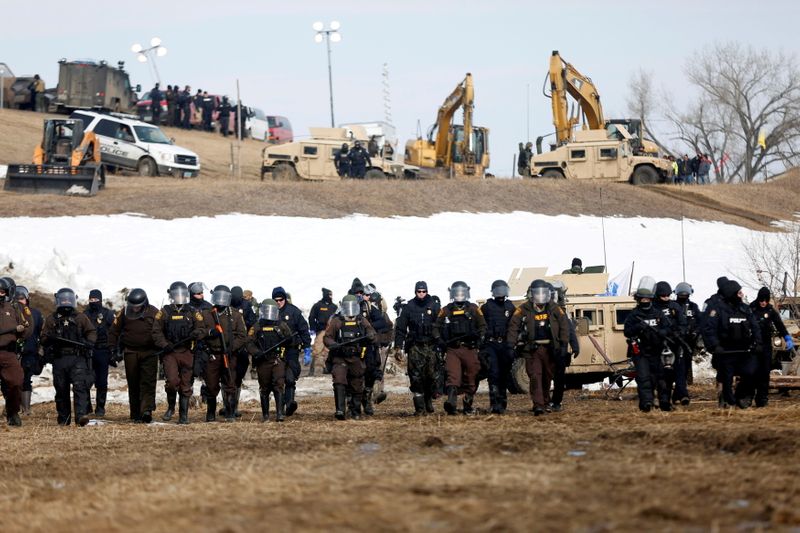By Devika Krishna Kumar
NEW YORK (Reuters) -A U.S. federal court judge on Friday denied a request from Native American tribes to shut the Dakota Access oil pipeline after a key environmental permit was scrapped last year, arguing the tribes had failed to prove the line's continued operation would cause irreversible harm.
The 570,000 barrel per day (bpd) pipeline out of North Dakota that travels under a Missouri River reservoir is now likely to stay running at least until a new federal environmental review is completed next year.
The pipeline's continued operation provides some clarity to market participants after months of uncertainty. A closure of the pipeline threatened to roil oil markets and create congestion on rail lines out of the region.
The pipeline, operated by Dallas-based Energy Transfer (NYSE:ET) LP, entered service in 2017 following months of protests by environmentalists, Native American tribes and their supporters. The pipeline's opponents said its construction destroyed sacred artifacts and posed a threat to Lake Oahe, a critical drinking supply, and the greater Missouri River.
Washington-based U.S. District Judge James Boasberg denied a request for an injunction to shut the pipeline and ordered the parties in the case to file a joint status report by June 11 on potential next steps. The judge said the tribes did not clear the "daunting hurdle" of proving that keeping the line open would create irreparable injury.
The U.S. Army Corps of Engineers is expected to complete its review of the pipeline in March 2022.
Operators of the pipeline, including Energy Transfer, have argued that it has complied with regulatory and safety requirements.
Boasberg last year handed a setback to the pipeline's proponents by stripping it of its permit to cross under Lake Oahe and requiring that portion of the pipeline to undergo an environmental review.
"The Court acknowledges the Tribes' plight, as well as their understandable frustration with a political process in which they all too often seem to come up just short," Boasberg wrote in his decision on Friday.
Energy Transfer did not immediately respond to a request for comment.
"We believe the Dakota Access Pipeline is too dangerous to operate and should be shuttered while environmental and safety implications are studied - but despite our best efforts, today's injunction was not granted," the group Earthjustice, which represents the Standing Rock Sioux tribe in the lawsuit, said in a statement Friday.
"The unacceptable risk of an oil spill, impacts to Tribal sovereignty and harm to drinking water supply must all be examined thoroughly in the months ahead as the U.S. Army Corps conducts its review of this pipeline," Earthjustice added.
Shares of Energy Transfer were up 1.4% to $10.16 following the ruling while shares of Phillips 66 Partners (NYSE:PSXP), which has a stake in the pipeline, rose more than 6%.
Shares of Bakken-focused producers, which would rely on the line, also rose on the news. Oasis Petroleum (NASDAQ:OAS) was up 6.8% to $85.41, while Continental Resources (NYSE:CLR) was up 2.5% to $30.80.
A coalition of businesses, trade associations and labor groups called Grow America's Infrastructure Now (GAIN) applauded the court's decision.

"We continue to believe that if the government and the courts make their decisions based on the facts – not politics – DAPL will be allowed to remain operational," Craig Stevens, spokesman for the GAIN Coalition, using the abbreviation for the Dakota Access pipeline.
"We hope that the administrative process is allowed to move forward, allowing the Army Corps of Engineers to complete its work – free of political pressure," he added.